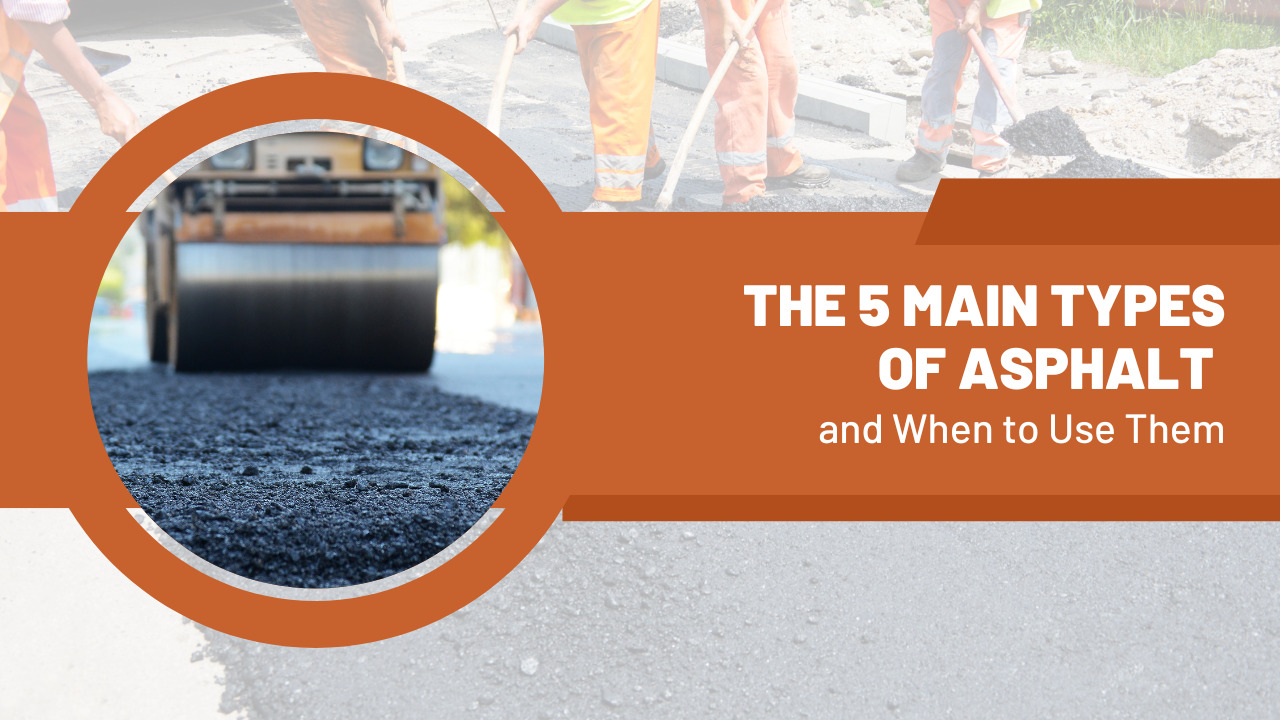When you’re preparing to use asphalt for a pavement job, or other purposes, the sheer amount of asphalt mixes in the marketplace can feel overwhelming.
However, there are five key types of asphalt that all mixes tend to fall under. By knowing the differences between these asphalt mixes, and what they are typically used for, you can quickly find the exact product that will match your project’s needs:
Table of Contents
Warm Mix Asphalt
One of the newest types of asphalt tech, warm mix asphalt is typically heated at a temperature between 30 and 120 degrees Fahrenheit – which is lower than traditional hot mix asphalt. The warm mix variant has been created to allow hot mix-type jobs to be done in colder climates and during colder months.
With the impressive flexibility this gives pavers, the paving season is now extended. The transportation of warm mix asphalt is less problematic than a traditional hot mix as well, allowing it to be one of the more accessible, safer, and more affordable types of asphalt to invest in today.
Lastly, warm mix asphalt is created using less fuel than many other asphalt variants, which makes it a strong choice for those looking to be environmentally friendly.
Hot Mix Asphalt
Speaking of hot mix asphalt, this is the variant that’s most frequently used on roads, and for pavement jobs. There’s a notably flexible mix of coarse and fine aggregate, mixed with asphalt binder, within most hot mix asphalt products.
This unique mixture creates an asphalt product that’s more weather-resistant for pavement jobs, and which has made the product popular in particularly warm climates and seasons.
Typically, hot mix asphalt will be poured at temperatures between 300 and 350 degrees Fahrenheit to achieve its maximum efficiency.
The biggest issue with hot mix asphalt is its tendency to rapidly cool, so it requires a skilled, experienced paver to get the job done right. For this reason, always hire a professional commercial paving company when using any type of hot mix asphalt.
Porous Asphalt
One of the most unique types of asphalt out there, porous asphalt allows water to drain through the pavement, where it drains into an underlying stone recharge bed that then slowly goes into the soil below.
Given these unique properties, it’s best used in places where large swaths of pavement are needed, and large amounts of weight will be placed on those swaths of pavement.
Playgrounds, parking lots, sidewalks, and driveways are all popularly created using porous asphalt for this reason. Because this asphalt has built-in flexibility and durability, it’s fantastic for locations that have heavy rain seasons, and high moisture environments as well.
Finally, the natural drainage capabilities of porous asphalt make it a more environmentally friendly asphalt product choice.
MC Cold Mix
One of the few asphalt types that are known for being used cold, MC cold mix asphalt is used on properties where traffic needs are lighter than normal, and the mix is often more affordable to apply in comparison to the other types of asphalt mix on this list.
Additionally, MC cold mix has often been used to make quick or temporary repairs to the pavement, especially in large parking lots where large-scale changes could become expensive and hard to execute otherwise.
Additionally, when the temperatures are not appropriate or safe for typical hot mix asphalt, MC cold mix can be used to ensure a temporary job can be done effectively.
Because MC cold mix is often meant to be temporary, it’s crafted in a way that allows it to be removed. After being removed, the mix can also be stockpiled so that it can be used later on, making it great for recycling materials.
Dense-Graded Mixes
Dense-graded mixes share a lot in common with regular hot mix asphalt and are often considered more of a variant of that type of mix. That being said, it’s made to be used for a wider range of general purposes, and can be used for environments with any traffic conditions.
These mixes can be classified as either coarse-graded or fine-graded, and offer a great solution for patching, leveling, friction, and structural needs. Many potholes are repaired using this type of asphalt mix.
Find the Right Pavement for the Job
With the right pavement, you can make your project pitch perfect. Whether you have specific cost, purpose, or environmental needs in mind, a professional paver can help you choose the right type of pavement mix for the job. After all, making the right decision will save you tons in the long run.





